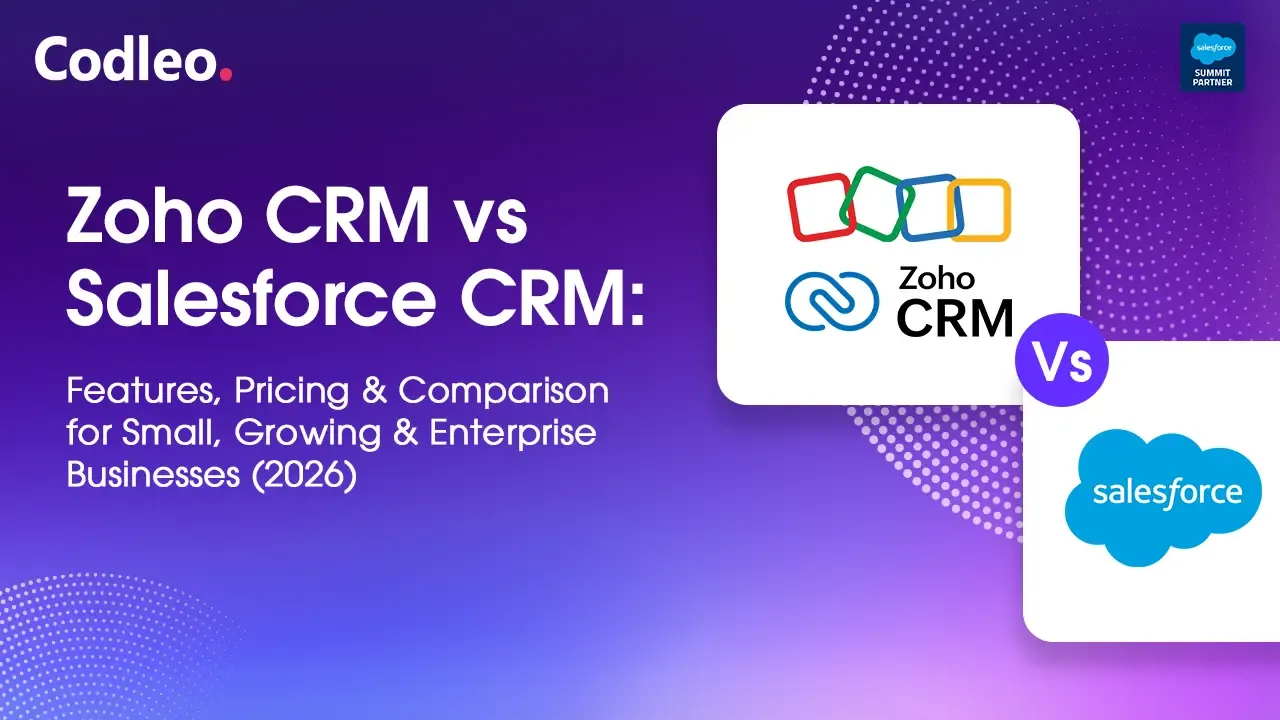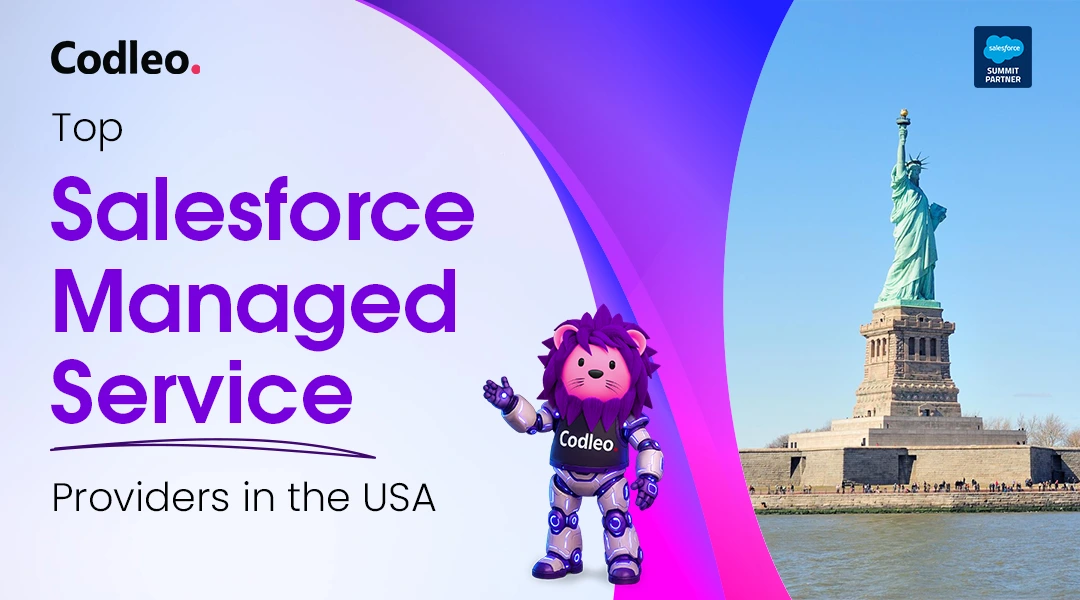Publish date:
Understanding the costs of implementing Salesforce CRM is essential for any business. As one of the top software solutions for managing sales and customer relationships, Salesforce can significantly affect your expenses, profitability, and overall success.
In this guide, we’ll break down the key factors that impact the cost of using Salesforce CRM. We’ll cover everything from licensing fees and setup costs to ongoing maintenance and support expenses, giving you a full picture of what to expect.
We'll also touch on the return on investment (ROI) that Salesforce CRM can offer. By helping businesses improve their sales processes, increase customer satisfaction, and boost revenue, Salesforce has the potential to deliver significant value.
Whether you’re running a small business, managing a growing company, or leading a large enterprise, this guide will help you understand the financial aspects of Salesforce CRM. With this knowledge, you can make smarter decisions about how this platform fits into your business plan and budget.
Pricing
Cost per User or Per Month
When looking at Salesforce CRM, one of the main things to consider is its pricing. Salesforce offers different pricing plans to meet the needs of various businesses.
You can choose between different user levels and subscription options, depending on what your business requires. The cost will vary based on the plan you select.
It’s also important to know that pricing can differ depending on your business size or industry. Certain industries might need specific features that could come with extra fees.
By understanding how the pricing works and assessing your business needs, you can choose the plan that fits your organization best.
Additional Fees and Customizations
Besides the standard pricing, Salesforce CRM offers add-ons and customizations to help businesses get the most out of their CRM.
Depending on your needs, you might require extra features or tools, such as advanced reporting, industry-specific solutions, or specialized integrations. These additional options often come with extra costs.
Customizations can bring a lot of value, but it’s important to think about the expenses involved. Adding custom features may require extra fees for development, maintenance, and ongoing support.
By weighing the benefits and costs of these add-ons and customizations, you can decide which options will best help your business reach its goals.
Discounts and Promotions
Salesforce CRM sometimes provides discounts or special promotions that can help businesses save money on their investment.
Keeping an eye out for these deals allows you to take advantage of cost-saving opportunities. However, it's important to note that discounts may come with specific terms and conditions, so make sure to review the details carefully.
Using a promotion or discount when setting up Salesforce CRM is a great way to get the most value while reducing your overall costs.
ROI and Value
Assessing Cost-Effectiveness
Evaluating the cost-effectiveness of Salesforce CRM is crucial when looking for a solution to improve sales productivity, increase revenue, and reduce costs.
Salesforce CRM offers several advantages to help your business succeed:
-
Enhanced Sales Productivity: The platform simplifies managing customer interactions, letting your sales team focus more on selling and less on time-consuming admin tasks.
-
Higher Revenue: Salesforce helps you identify and prioritize high-value leads, leading to more successful conversions and, in turn, boosting revenue.
-
Lower Costs: By automating routine tasks, Salesforce cuts down on manual work like data entry, saving both time and resources.
These benefits make Salesforce CRM a valuable tool for driving business growth and efficiency.
Quantifying the Value
Understanding the value of Salesforce CRM is crucial for businesses. To measure its impact, consider these steps:
-
Review your current processes: Look at your current workflows and identify areas where Salesforce CRM can streamline tasks, automate processes, or resolve bottlenecks.
-
Estimate potential cost savings: Calculate the time and resources you currently spend on manual tasks. By automating these with Salesforce CRM, you can reduce costs significantly.
-
Explore revenue growth opportunities: Think about how Salesforce can improve your sales cycle. Increased lead conversions, better customer retention, and more upsell opportunities can all drive revenue growth.
By assessing these factors, you can better understand the ROI and value Salesforce CRM can offer, helping you decide if it’s the right investment for your business.
Comparisons
1. Cost Comparison with Other CRM Systems
When evaluating Salesforce CRM, it’s important to compare its costs with other CRM platforms. Doing a detailed comparison helps businesses choose the best option based on their needs and budget.
-
Detailed analysis: We’ll explore the features, capabilities, and pricing of alternative CRMs, offering a clear comparison with Salesforce CRM.
-
Understanding features and pricing: It’s crucial to know what features other CRMs offer and how their prices differ. This helps businesses pick the CRM that fits their specific needs and budget.
2. Comparing Features and Pricing
Choosing the right CRM involves looking at the features and pricing of various platforms. This ensures you get the best match for your business requirements.
-
Why it’s important: Understanding the features and capabilities of different CRM systems is key. It allows businesses to choose a platform that suits their needs and budget effectively.
-
Tips for smart decisions: We offer useful tips to help businesses weigh both features and price points, making it easier to find the right CRM solution.
Implementation and Integration Costs
Expenses Related to Implementation
When introducing Salesforce CRM into your existing workflows, several costs come into play. These include:
-
Data Migration: The cost of transferring your existing data into Salesforce CRM.
-
Customization: Expenses tied to customizing Salesforce CRM to fit your business processes and unique needs.
-
Training: The cost of teaching your team how to use Salesforce CRM effectively.
-
Consultants or Developers: If you need expert help for smooth integration and customization, there may be costs involved in hiring professionals.
Integration Costs
Integrating Salesforce CRM with other software or platforms can also incur extra costs. Key factors to consider:
-
Software Integration: The cost of connecting Salesforce CRM with other important business tools.
-
Platform Integration: Expenses related to syncing Salesforce CRM with your current platforms.
Tips for Managing Costs and Maximizing Efficiency
-
Plan Ahead: Review your integration needs and develop a clear strategy for implementation.
-
Use Available Resources: Salesforce offers extensive documentation and an active user community for support and guidance.
-
Consult Experts: Work with experienced consultants or developers for advice and technical assistance.
-
Keep Communication Open: Ensure good communication between your team and integration specialists.
-
Invest in Training: Properly train your employees so they can make the most of the integrated CRM system.
By considering these costs and tips, you can make the Salesforce CRM implementation process smoother and more cost-effective for your business.
Scaling and Upgrade Costs
As your business grows, it’s crucial to scale and upgrade your Salesforce CRM system. Salesforce is designed to adapt to your evolving needs, making it a flexible solution for businesses.
However, it’s important to be aware of the potential costs involved when you scale or upgrade your platform. You may need to add more users, increase storage space, or move to a higher-tier edition of Salesforce CRM as your operations expand.
These costs can vary based on your business size and the scope of the upgrade. Here are some key factors to consider:
-
User Licenses: Adding users will require purchasing extra licenses, with costs depending on the edition you choose.
-
Storage Space: As you gather more data, you may need to increase your storage capacity, which can come with additional fees.
-
Integration and Customization: Scaling may involve integrating Salesforce with other applications or customizing it to meet your changing needs, which can add to your expenses.
-
Training and Support: When upgrading or expanding your CRM, budget for training your team and ongoing support to help them make the most of the new features.
Tips for Managing Scaling and Upgrade Costs
-
Prioritize Needs: Focus on the most critical needs for your business when allocating resources for upgrades.
-
Create a Roadmap: Outline a plan for your CRM upgrades and expansions, detailing the steps, timeline, and expected costs. This will help you manage the process effectively.
-
Work with Consulting Partners: Engage with Salesforce consulting partners for expert advice. They can help you make informed decisions about scaling and upgrading while keeping costs in check.
By planning ahead and considering these costs, you can ensure a smooth and budget-friendly process when scaling and upgrading your Salesforce CRM system.
Hidden or Additional Costs
1. Uncovering Hidden Costs
When looking into Salesforce CRM, it’s crucial to be aware of potential hidden costs that could affect your budget. Here are a few expenses to watch for:
-
Extra Storage Fees: If your business needs more data storage than what’s included, you may face additional charges.
-
Premium Support Fees: While basic support is usually part of your plan, premium support options often come at an extra cost.
-
Third-Party Integrations: Connecting Salesforce CRM with other tools or systems can lead to additional fees.
2. Mitigating Additional Costs
To help manage or reduce hidden costs associated with Salesforce CRM, consider these tips:
-
Optimize Usage: Make sure your team is trained to use the platform effectively. This helps you get the most out of its features without incurring extra costs.
-
Leverage Automation: Use Salesforce’s automation features to simplify processes and reduce manual work, which can save you money over time.
-
Utilize Free Resources: Take advantage of the many free resources, guides, and community support available through Salesforce. This can help you tackle challenges without incurring unnecessary expenses.
By being mindful of these potential costs and following these tips, you can better manage your Salesforce CRM investment.
Cost-Saving Strategies
1. Optimizing Usage for Cost Reduction
To lower unnecessary expenses with Salesforce CRM, businesses can take several steps to optimize their usage:
-
Manage User Licenses: Assign licenses only to essential users. This helps ensure you’re not paying for unused accounts.
-
Streamline Processes: Identify and remove any redundant or underused processes to make operations more efficient and cost-effective.
-
Regular Reviews: Frequently review your Salesforce configurations to ensure you're only paying for the features you actually need.
2. Leveraging Automation Features
Businesses can save costs and boost efficiency by utilizing Salesforce CRM's automation features. Here’s how:
-
Automate Repetitive Tasks: Look for tasks that can be automated, like data entry, follow-ups, and lead nurturing.
-
Create Workflows: Set up workflows and triggers in Salesforce CRM to handle these tasks automatically, reducing the need for manual work.
-
Use Email Templates: Take advantage of email templates and automatic sending features to streamline communications and cut down on repetitive email tasks.
3. Utilizing Salesforce's Free Resources
Salesforce offers many free resources and community support that businesses can use to save money and get more value from the platform:
-
Join the Trailblazer Community: Engage with other users in the Salesforce Trailblazer Community, where you can share tips and solutions to make the most of the platform.
-
Access Training Materials: Use Salesforce’s extensive library of training materials, webinars, and documentation to improve your team’s skills and knowledge.
-
Seek Help in Support Forums: Get advice from Salesforce support forums to solve issues and optimize your CRM usage without incurring extra costs.
By focusing on these strategies, businesses can effectively manage their Salesforce CRM costs while maximizing its benefits.
Reviews and Satisfaction
When evaluating Salesforce CRM's pricing and value, it's essential to consider customer satisfaction and user feedback. Here’s why it matters:
-
Understanding Customer Satisfaction: Customer satisfaction is key to assessing whether Salesforce CRM is worth the cost. By looking at user experiences, you can gain insights into how reliable and effective the platform is.
-
Reading Online Reviews: Explore reviews from current Salesforce CRM users. These reviews can give you an honest perspective on the platform’s features, ease of use, and overall satisfaction.
-
Identifying Common Issues: User feedback can help you pinpoint potential problems that might influence your decision. Look for recurring themes or concerns in the reviews to understand what others have experienced.
By analyzing this feedback, you can determine if the pricing aligns with the value you expect from Salesforce CRM.
Incorporating User Experiences in Decision-Making
To make a well-informed decision, consider these approaches:
-
Engage in Online Communities: Join forums and online groups where Salesforce CRM users share their experiences. Asking questions and participating in discussions can reveal insights not found in official materials.
-
Talk to Industry Peers: Reach out to colleagues or industry contacts who have used Salesforce CRM. Their firsthand experiences can offer valuable guidance on satisfaction and how the software has impacted their business.
-
Attend User Conferences: Participate in events and conferences where Salesforce CRM users gather. Networking with them allows you to discuss their experiences and gather insights on pricing and satisfaction.
-
Explore Review Websites: Use user rating platforms to see overall satisfaction scores and detailed feedback from Salesforce CRM users. These platforms provide a clear overview of the strengths and weaknesses of the CRM.
By incorporating these user experiences into your evaluation process, you can make a more informed decision about Salesforce CRM.
Conclusion
In conclusion, understanding the costs associated with Salesforce CRM is vital for any business.
This guide has covered various important topics, including the pricing structure, return on investment (ROI), comparisons with other CRM options, implementation and integration costs, as well as expenses related to scaling and upgrades. We also looked at hidden fees, cost-saving strategies, and user satisfaction.
By considering these points, businesses can gain a clearer picture of what Salesforce CRM will truly cost and how it can benefit them. It's important to remember that the costs are not just about the initial price; they include factors like setup, growth, and ongoing support.
We encourage you to explore the topics we've discussed further. This deeper understanding will help you decide if Salesforce CRM fits within your budget and meets your business goals.
Ultimately, grasping the costs and benefits of Salesforce CRM is essential for making smart decisions that foster growth and success.
Ready to take your business to the next level with Salesforce CRM? Understanding the costs involved is the first step toward maximizing your investment. At Codleo Consulting, we’re here to guide you through the pricing structure, implementation, and potential ROI of Salesforce CRM tailored to your needs. Contact us today to discover how we can help you make informed decisions and drive growth for your business!















